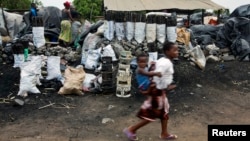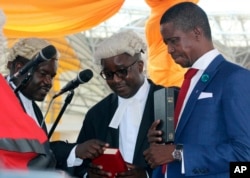In his “crusade to crush poverty,” Zambia’s new leader, Edgar Lungu, is following in the footsteps of populist President Michael Sata who died in October. His lofty campaign pledges might have been enough to edge him to victory in this month’s poll, but with another election due in 18 months, his “crusade” might be all but impossible: Zambia’s public finances are stretched to the limit and its mainstay copper business is in turmoil.
Copper market
In Kitwe city, in the heart of Zambia’s Copperbelt region, bustling South African supermarkets and restaurants attest to the heady days of a copper boom that this region has relished for the past decade.
Copper demand flourished as emerging markets like China gobbled up the metal to make bridges, cars and more or less anything that ran on electricity. Copper has enriched Zambia, employing 90,000 people and contributing 75 percent of Zambia’s foreign exchange earnings and 13 percent of GDP.
But its future is precarious, as China’s slowing growth has caused copper prices to slide to a near six-year-low.
In Chibuluma mine, 500 meters underground, assistant mine manager, Joseph Moya, said mining companies will have to start cutting costs to make a profit.
“The country actually depends on mining. It is the biggest taxpayer and source of revenue in Zambia," he said. "We need to go the extra mile, we need to put in a lot because we are actually surviving now, it is quite uncertain, everyone is worried and we don’t know what is next.”
Mining industry
Meanwhile, disputes between the government and mining companies have compounded the problem.
The government has accused the mining industry of tax avoidance, saying Zambia is losing $2 billion a year in revenue. In January, Zambia, which is Africa's second biggest copper producer, tripled open pit mining royalties to 20 percent and underground royalties from 6 percent to 8 percent.
Jackson Sikamo, general manager of Chibuluma mine and president of the Chamber of Mines, said the royalty hike could cost 12,000 jobs.
“We are cautiously optimistic that there will be a resolution, because when you look at the effect that the mineral tax is going to have on the industry, it is very clear that this tax system is not sustainable,” he said.
Zambia’s Copperbelt is the ruling party’s stronghold, hosting the highest number of registered voters. Failure to cushion the province from the impacts of falling copper prices could be a fatal blow to the Patriotic Front.
President Lungu beat his main rival by less than 2 percent in the recent election. Throughout his campaign, Lungu promised to fulfill late president Sata’s populist policies. During his three years in administration, Sata spent billions of dollars on infrastructure, grain and fuel subsidies and salary increases for civil servants.
Avoiding Debt
But with Zambia's mainstay copper industry in a downturn, Lungu has the task of avoiding more government debt and reviving economic growth currently flagging at 5.5 percent - the slowest pace in over a decade.
Lusaka-based economist, Oliver Saasa from Premier Consult, said that the populist policies implemented under Sata are unsustainable.
“The big challenge is that we are gradually getting into the debt trap, which might be dangerous to the growth prospects," he said. "I think that now, the new president will realize that the policies that are better spoken are not possible to undertake.”
Others worry that the slim win has left the party vulnerable ahead of next year’s national elections which could tempt the new president to push through expensive policies to retain popularity.
However, if Zambia’s new president fails to rein in public spending and improve relations with the ailing copper industry, he could be a sitting duck when Zambians go to the polls again in late 2016.





